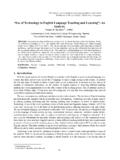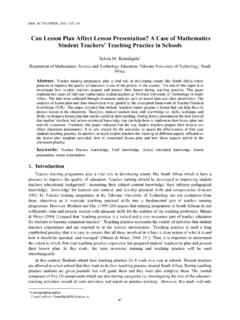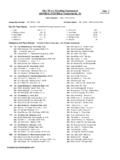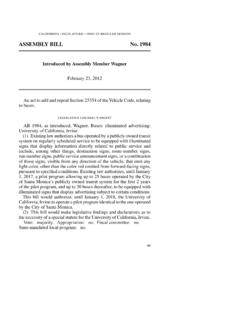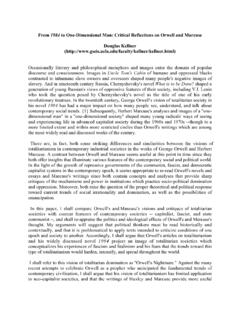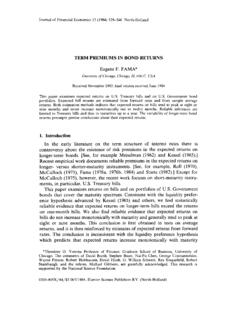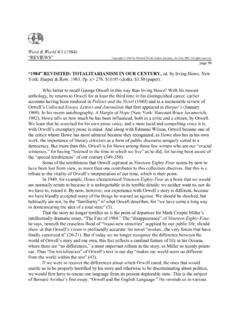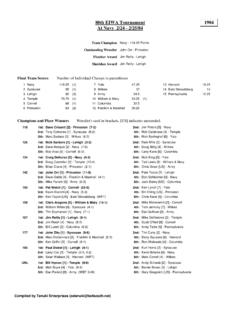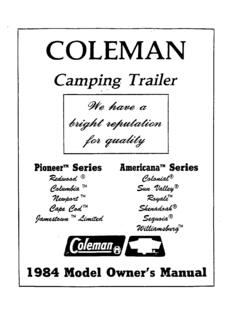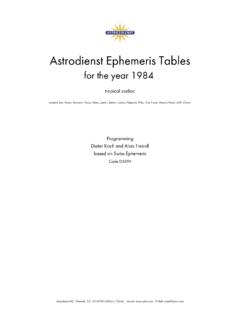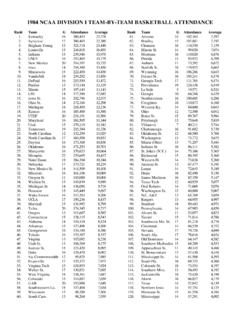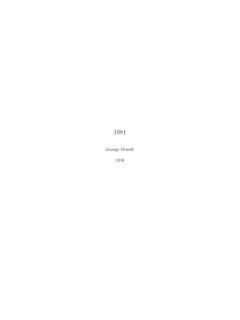Transcription of The abolition of the Past: History in George Orwell’s 1984
1 The abolition of the past : History in George Orwell s 1984 Carimo Mohomed1 Faculdade de Ci ncias Sociais e Humanas da Universidade Nova de Lisboa (Portugal) (Faculty of Social Sciences and Humanities of the New University of Lisbon) Abstract. Sometimes novels teach us more about a certain age or period than many History books. A work of fiction, by a Balzac, a Dickens or a Dostoyevsky, is more illuminating about nineteenth century s French, British or Russian societies, and its social conditions, mores, mentality, than many historiographical studies dealing with that period. George Orwell s 1984 is mainly considered a book about political totalitarianism. For Bertrand Russell it depicted, with very great power, the horrors of a well-established totalitarian regime of whatever type.
2 Almost everything is under control: the individual, family, society, emotions, sex, feelings, thoughts, and History . By reading 1984 and by following Winston Smith, the main character, who works in the Ministry of Truth and whose work reminds us and resembles what historians do, we are faced with History s and historian s fundamental problems: what is the past ? How do we know it? What is knowledge and, in this case, the knowledge of the past ? What is History ? Is it there for historians to discover or is it a historian s construction? Current and future historians have more to learn with this novel, and with other works of fiction, about their own craft than with many books on historiography, epistemological theory or methodology.
3 This paper tries to use this novel as a guide for our own m tier. Keywords: George Orwell; 1984; History ; historian; epistemology; ontology 1. Introduction It was a bright cold day in April, and the clocks were striking thirteen (Orwell, 1949). From the very beginning, with this opening sentence from George Orwell s 1984, we are made aware of the fact that the clocks were striking, not one, but thirteen. This is a society where Time, and its very notion, how it is perceived and materialised, has certainly suffered some kind of mutation, has been modified. When Winston, the main character in the novel, begins to write his diary he does not know with any certainty that this was 1984 because it was never possible nowadays to pin down any date within a year or two (Orwell, p.)
4 8). According to E. H. Carr, History begins when men begin to think of the passage of time in terms not of natural processes - the cycle of the seasons, the human life-span - but of a series of specific events in which men are consciously involved and which they can consciously influence (Carr, 1961). Historians have to deal with Time and if Time has changed, its notion altered, what are the consequences and the implications? In chapters II and III of part Three, during the interrogation and dialogue between Winston Smith and another character of the novel, O Brien, we are faced with two different conceptions of Time, in this case the past , conceptions which summarise all the angst of a historian.
5 O Brien asks Winston if, in his opinion, the past has real existence and, saying that Winston is no metaphysician, he continues by affirming that until this moment you had never considered what is meant by existence. I will put it more precisely. Does the past exist concretely, in space? Is there somewhere or other a place, a world of solid objects where the past is still happening? Winston replies in the negative and O Brien questions him then where does the past exist, if at all? In records. It is written down. 1 Tel.: 00 351 919353957 E-mail address: 71 2011 2nd International Conference on Humanities, Historical and Social Sciences IPEDR (2011) (2011)IACSIT Press, Singapore In records.
6 And - ? In the mind. In human memories. In memory. Very well, then. We, the Party, control all records, and we control all memories. Then we control the past , do we not? But how can you stop people remembering things? [..] It is involuntarily. It is outside oneself. How can you control memory? You have not controlled mine! (Orwell, pp. 251-252). Replying to Winston, O Brien says that reality is not external and only exists in the human mind, and nowhere else (p. 252), and that nothing exists except through human consciousness (p. 268). Margaret Macmillan quotes an episode which occurred in 2002 when a senior adviser of the White House said to journalist Ron Suskind that we re an empire now, and when we act, we create our own reality.
7 And while you re studying that reality judiciously, as you will we ll act again, creating other new realities, which you can study too, and that s how things will sort out. We re History s you, all of you, will be left to just study what we do (Macmillan, pp. 144-145). We find that dialogue between O Brien and Winston Smith in the final part of the book and throughout the novel other problems are raised, like what is History , with capital H, and what is History , the science/art/discipline done/made by historians. These themes and others like forgery, falsification, selection of facts or evidences, the role and importance of a historian s personal memory and personal experience, as well as the memories and experiences of those who are the object of study, problems posed by language and its evolution, and the responsibilities of a historian as a citizen, will be developed with more detail below.
8 2. A historian s craft In chapter IV of part One (Orwell, pp. 38-48), we can follow Winston Smith s job, which is similar to what historians do, constructing History , updating the past . As soon as he discovers or uncovers new facts, in this case the messages or orders from the Party, through the Ministry of Truth, Winston Smith alters, or as the official phrase had it , rectifies speeches, news, economic figures and so on. As soon as all the corrections which happened to be necessary in any particular number of the Times had been assembled and collated, that number would be reprinted, the original copy destroyed and the corrected copy placed on the files in its stead.
9 This process of continuous alteration was applied not only to newspapers, but to books, periodicals, pamphlets, posters, leaflets, films, sound tracks, cartoons, photographs to every kind of literature or documentation which might conceivably hold any political or ideological significance. Day by day and almost minute by minute the past was brought up to date. All History was a palimpsest, scraped clean and reinscribed exactly as often as was necessary. In no case would it have been possible, once the deed was done, to prove that any falsification had taken place (Orwell, pp. 40-41 and 183). As E. H. Carr said in his famous George Macaulay Trevelyan Lectures in 1961, particularly in the first one, The historian and his facts , the historian is necessarily selective.
10 The belief in a hard core of historical facts existing objectively and independently of the interpretation of the historian is a preposterous fallacy, but one which it is very hard to eradicate. He has the dual task of discovering the few significant facts and turning them into facts of History , and of discarding the many insignificant facts as unhistorical . Then he quotes the American historian Carl Becker, who, in 1910, argued that the facts of History do not exist for any historian till he creates them . The facts of History never come to us pure, since they do not and cannot exist in a pure form: they are always refracted through the mind of the recorder.
